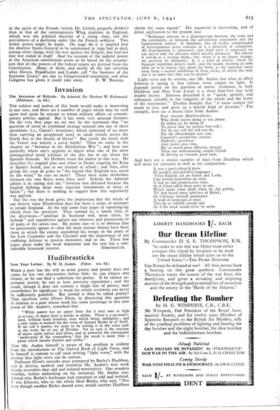Invasion
The Invasion of Britain. By Admiral Sir Herbert W. Richmond. (Methuen. 28.6d.)
THE subject and author of this book would make it interesting in any case, and there are a number of pages which may be read again and again by anyone to whom military affairs or contem- porary politics appeal. But it has some very unusual features. On the very first page we are met by the statement that " no question of naval or combined strategy entered into any of these operations (i.e., Caesar's invasions), which consisted of no more than carrying an unopposed army in small vessels across the North Sea or the Straits of Dover." But surely the battle with the Veneti was strictly a naval battle! Then we come to the chapter on " Invasion in the Elizabethan War " ; and here one naturally whets one's appetite to digest what one of the most distinguished naval scholars of the day has to say about the Spanish Armada. Sir Herbert treats the matter in this way. He describes the original plan and refers to Drake singeing the King of Spain's beard, just as we learned at school ; and then, after giving the coup de grace to " the legend that England was saved by the wind," he says no more! There were some skirmishes between the two fleets, were there not? Indeed, the Admiral admits it in stating that the " invasion was defeated because the English fighting ships were superior instruments to those of Spain " ; but there is nothing to suggest how this superiority was applied.
For the rest the book gives the impression that the whole of our history since Elizabethan days has been a series of attempts to invade England. At the end come four pages of summing-up which rivet the attention. They remind us, a timely hint, of the diversions—" landings in Scotland and, more often, in Ireland " and expeditions against our interests and possessions in all parts of the seven seas. He points out—it is so obvious that we persistently ignore it—that the most serious threats have been those in which the enemy assembled his troops in the ports of the Low Countries and the Channel and the importance of not confining defence to passive measures, and so on. These few pages alone make the book important and the rest has a con-
siderable historical interest. STRATEGICUS.


























 Previous page
Previous page